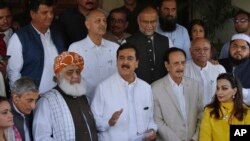At least four Pakistani political parties said Monday they will join hands against the "stolen mandate" of Imran Khan, whose party won the most votes in an election marred by allegations of fraud.
But it's unclear whether they have the political will or the seats to prevent Khan — a former cricket star who is believed to be backed by the military — from becoming the next prime minister.
Khan's Tehrik-e-Insaf Party won the most seats, with 115, but fell short of a majority in the 242-seat assembly. His party says it has enough support to form the national government as well as two provincial governments.
The Pakistan Muslim League of former Prime Minister Nawaz Sharif, which came in second with 64 seats, along with the Pakistan People's Party, which won 43, a religious alliance known as the Muttahida Majlis-e-Amal or MMA, with 12 seats, and the secular Awami National Party issued a joint declaration against the alleged vote rigging and suppression of the media. They condemned the interference of "state agencies" in the election, a veiled reference to the military and intelligence apparatus.
Along with another small party that has protested the election, they would have 125 seats, enough to theoretically prevent Khan from becoming prime minister. But the Pakistan People's Party has said he should be allowed to form a government, and the parties opposed to Khan are ideologically at odds with one another.
Fazlur Rehman, a hard-line cleric who heads the MMA, said the parties rejected the interference of state agencies in the vote and the suppression of the media. Former Prime Minister Yousuf Raza Gilani, of the Pakistan People's Party, called the July 25 election the "worst rigged" in history. Supporters of the Awami National Party, which won a single seat, have held demonstrations in different cities against the alleged vote rigging.
Fawad Chaudhry, a spokesman for Khan's party, said that with independents it has the support of 168 members of the national parliament. He said it also has a majority in the Punjab province — the country's largest — and the Khyber Pakhtunkhwa province in the northeast, bordering Afghanistan.
Indian Prime Minister Narendra Modi called Khan on Monday and congratulated him on his party's victory in the elections. Raveesh Kumar, spokesman for India's External Affairs Ministry, said Modi expressed hope that democracy would take deeper root in Pakistan.
The two nuclear-armed rivals have fought three wars since gaining independence from Britain.




